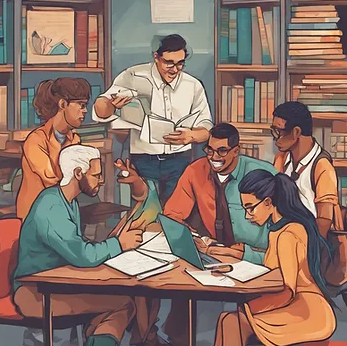Innovative Approaches to Adult Education: The Role of Gamification in Enhancing Digital Literacy and Inclusivity
- Rémi Olliveaux

- 22 ago 2024
- 3 Min. de lectura
Actualizado: 25 mar 2025
In an era where technology dominates, traditional methods of learning, which often rely on rote memorization and lecture-based instruction, are increasingly seen as inadequate for meeting the diverse needs of adult learners. The modern working world demands a more dynamic, engaging, and inclusive approach—one that not only imparts knowledge but also equips learners with the digital skills essential for today’s fast-paced society. This is where gamification emerges as a transformative tool in adult education.
Gamification, the application of game design elements in non-game contexts, has shown great promise in making learning not only more enjoyable but also more effective. By integrating game-like elements such as points, levels, badges, and interactive challenges, educators can craft learning environments that encourage engagement and participation. For adult learners—many of whom may be returning to education after long gaps—this shift from traditional methods can make the difference between disengagement and active involvement.
Indeed, one of the main advantages of gamification is its ability to avoid monotony. Adults, unlike younger students, bring with them a wealth of experiences and expectations that can oppose traditional means of learning. Gamified learning responds to new expectations thanks to its efficiency. By turning lessons into interactive experiences, it taps into the natural human desire for achievement and recognition, making the learning process more enjoyable and less of a chore.
Moreover, gamification in adult education can significantly enhance digital literacy—a critical skill in today’s world. For educators, adopting digital tools and integrating them into their teaching methods not only enhances their own technological fluency but also positions them as leaders in a digitally driven society. For learners, especially those who may have had limited exposure to technology, engaging with online games and digital platforms can be an empowering experience. It provides them with the opportunity to develop crucial digital skills in a low-pressure, enjoyable setting.
Beyond digital literacy, gamification has the potential to make education more inclusive. Adult learners often come from diverse backgrounds, with varying levels of access to educational resources. Indeed, gamification allows to adapt to diverse learning styles with more flexibility, to reduce language barriers with visual elements (icons, animations, interactive tasks…), to encourage active participation, or to offer instant feedback and support. This not only broadens access to education but also ensures that learning is tailored to the unique needs of everyone.
Inclusivity is not just about access—it’s about engagement. Gamification encourages active participation, ensuring that learners are not just passive recipients of information but active contributors to their own educational journey. This participatory approach is especially important in adult education, where learners bring a wealth of life experience that can enrich the learning environment.
Finally, gamification equips educators with new skills that are increasingly relevant in the digital era. As they learn to integrate these tools into their teaching, they also develop a broader understanding of how technology can be used to enhance education. This professional development is crucial, as it ensures that educators remain at the forefront of educational innovation, capable of preparing their students not just for today’s challenges, but for the future.
Gamification represents a significant shift in how we approach adult education. By making learning more engaging, enhancing digital literacy, and promoting inclusivity, it holds the potential to transform the educational landscape. As we continue to explore new ways of teaching and learning in the digital age, it is essential that we embrace innovative approaches like gamification—not just as a trend, but as a powerful tool for creating a more equitable and dynamic educational experience for all.









A compelling reflection on how gamification can reshape adult education for a digital era. The emphasis on inclusivity and digital literacy shows how this approach empowers learners from diverse backgrounds. It’s inspiring to see how educators can use these tools not only to engage but also to prepare adults for future challenges.
Gamification to break the monotony in adult education it´s a great option for inclusive education in the digital era. it's a wonderful way to break the stereotypes that ‘games are for younger people’ and
Thanks for this interesting article!